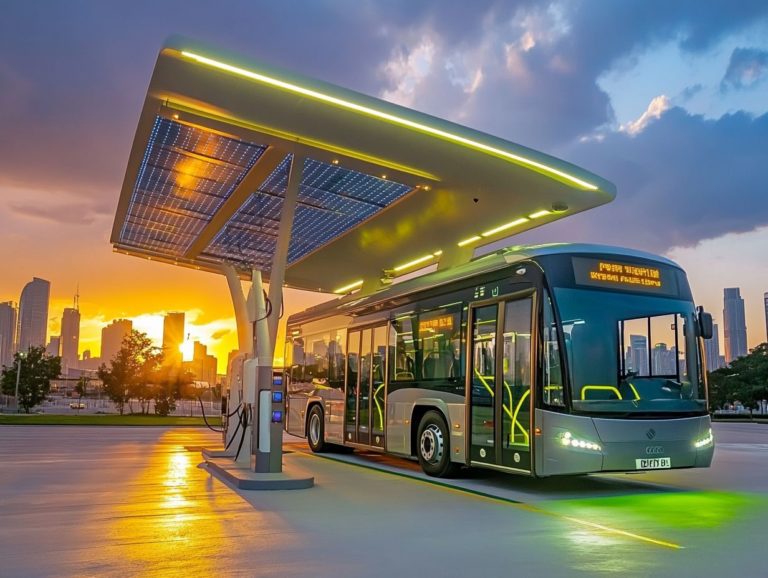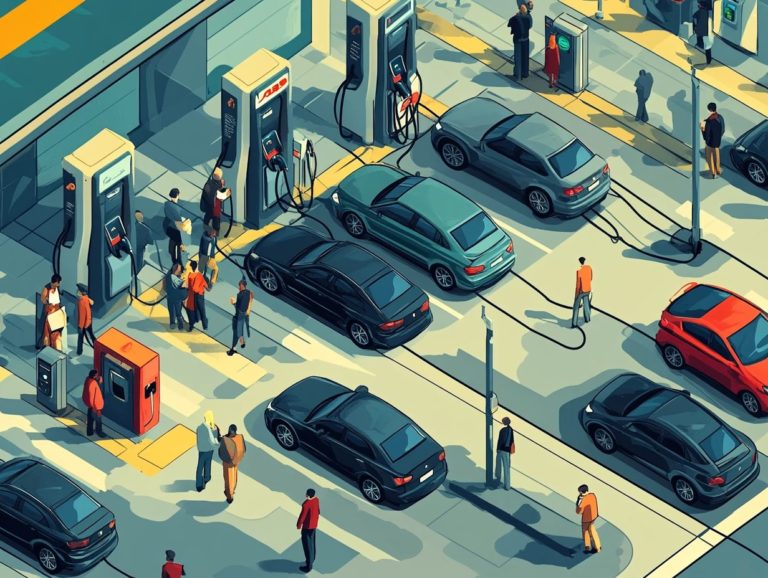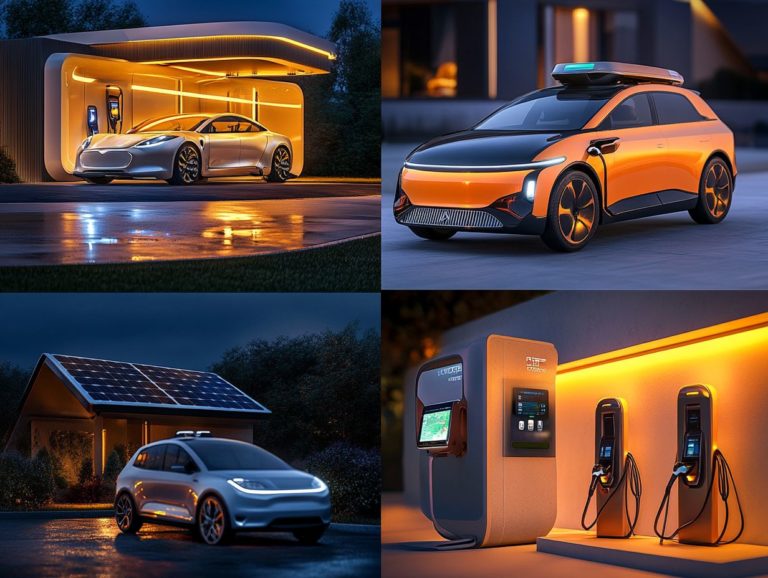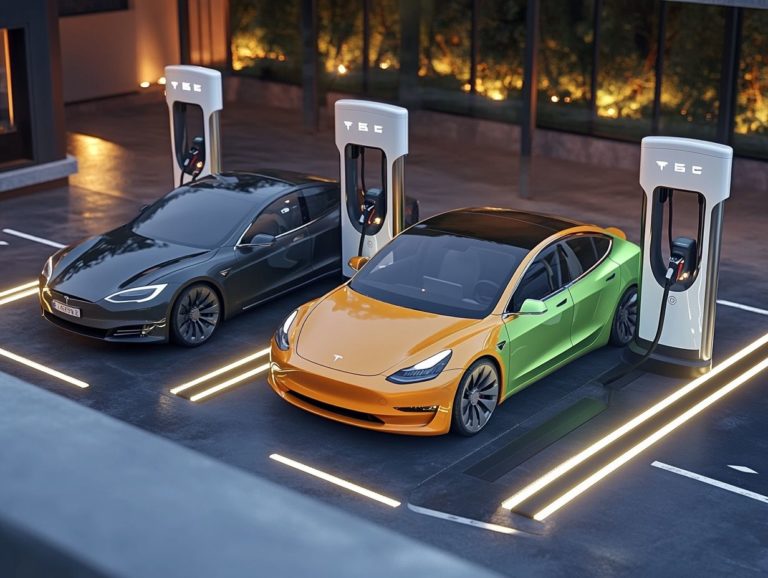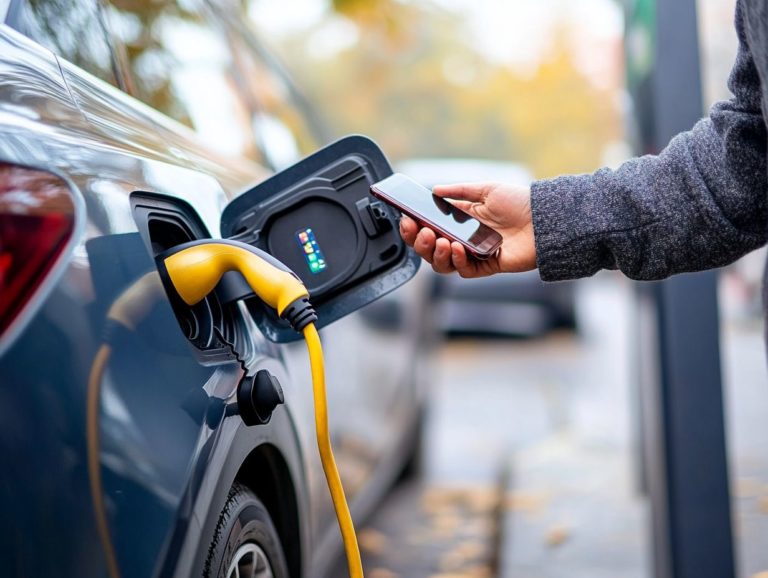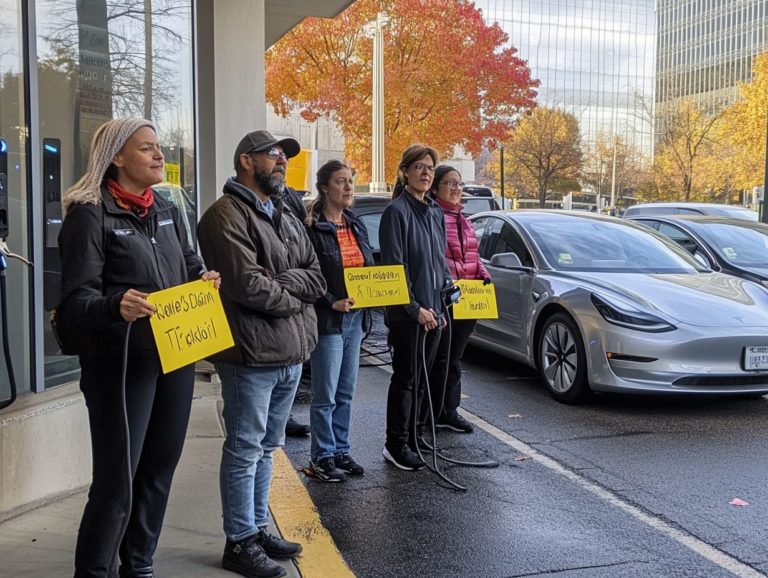the pros and cons of home charging stations
As electric vehicles (EVs) continue to rise in popularity, you might be considering a home charging station as a convenient way to recharge your car.
This discussion delves into the myriad benefits of having a home charging station, from saving both time and money to contributing positively to the environment. However, it s crucial to balance these advantages with potential drawbacks, such as installation costs and compatibility concerns.
Key factors will be highlighted to help you make an informed investment decision, along with alternatives if a home setup doesn t quite fit your needs.
Explore whether a home charging station is the perfect choice for your electric journey.
Contents
- Key Takeaways:
- What are Home Charging Stations?
- Benefits of Home Charging Stations
- Potential Drawbacks of Home Charging Stations
- Factors to Consider Before Installing a Home Charging Station
- Alternatives to Home Charging Stations
- Frequently Asked Questions
- What are the benefits of having a home charging station for my electric vehicle?
- Are there any drawbacks to having a home charging station?
- Can I use a home charging station for all types of electric vehicles?
- How long does it take to charge an electric vehicle using a home charging station?
- Can I save money by using a home charging station instead of public charging stations?
- Are there any potential safety concerns with electric vehicle chargers?
Key Takeaways:
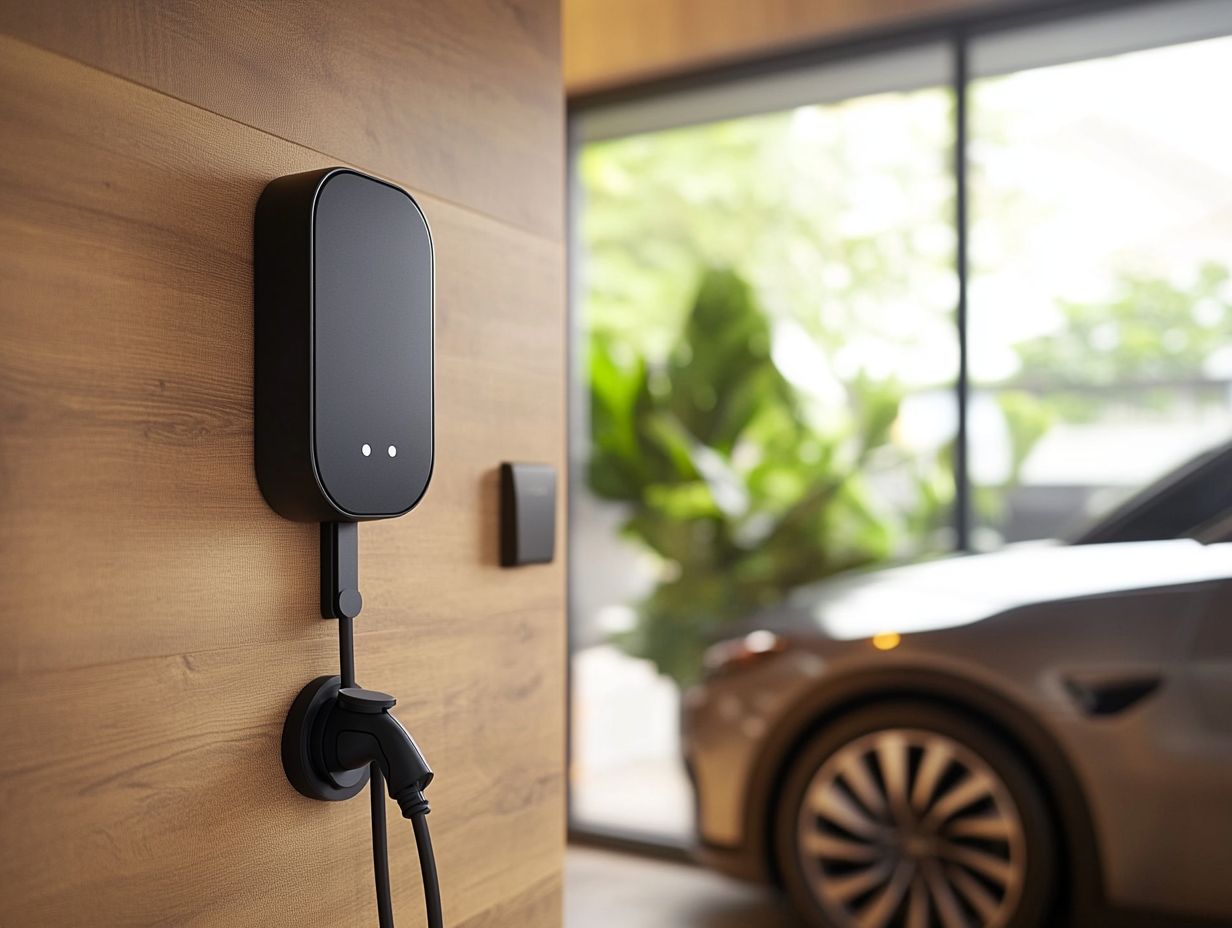
Home charging stations offer convenience and cost savings for electric vehicle owners.
Using a home charging station can have a positive impact on the environment.
Before installing a home charging station, consider factors such as installation costs and vehicle compatibility.
What are Home Charging Stations?
Home charging stations play a pivotal role in the electric vehicle (EV) landscape, providing you with the convenience of charging your electric car right at home. These stations not only streamline the charging process but also encourage the wider adoption of electric vehicles.
They mesh effortlessly with the existing charging infrastructure, offering different types of home charging stations that charge at different speeds, including Level 1 and Level 2 chargers.
Technological advancements have led to fast charging stations, which significantly reduce charging times and enhance your overall home charging experience.
Benefits of Home Charging Stations
Home charging stations offer exciting benefits that can transform your electric vehicle experience, providing unparalleled convenience and substantial cost savings when compared to traditional gasoline-powered vehicles.
The simplicity of charging at home alleviates any concerns about range anxiety, allowing you to harness renewable energy sources like solar and wind power for your charging needs.
Additionally, recent advancements in charging speed and options empower you to effectively manage your charging times, making the entire process seamless and efficient.
Convenience and Cost Savings
One of the standout benefits of home charging stations is the convenience they bring, enabling you to charge your electric vehicle overnight while capitalizing on significant savings in electricity costs.
This not only simplifies your charging routine but also markedly decreases the need to make frequent trips to public charging stations.
By investing in a home charging unit, you sidestep the often inflated fees associated with public chargers, which can vary unpredictably based on demand.
Charging at home typically allows you to leverage lower off-peak electricity rates, offering a financial advantage over traditional fuel expenses. As a result, the cumulative savings from home charging will likely add up over time, leading to a more budget-friendly and environmentally conscious driving experience.
Environmental Impact
Home charging stations play a crucial role in enhancing environmental benefits by encouraging the adoption of electric vehicles, which are essential for reducing carbon emissions and improving air quality.
By allowing you to recharge your vehicle at home, these stations facilitate a smooth transition to renewable energy, especially when combined with solar installations. This partnership significantly lowers reliance on fossil fuels, paving the way for a cleaner energy landscape.
Companies like Bonney and LandGate are key players in this transition, offering innovative solutions and supporting infrastructure that harnesses wind, solar, and other renewable sources.
The widespread adoption of home charging stations gives the power to you as a homeowner to generate your own electricity. This not only supports local and national clean energy initiatives but also helps foster a more sustainable future for everyone.
Don t miss out on the chance to enjoy the incredible savings and convenience that home charging stations provide!
Consider how to choose the right home charging station by evaluating factors like power requirements and budget. This will ensure you make the best decision for your electric vehicle journey.
Potential Drawbacks of Home Charging Stations

While home charging stations offer many benefits, it’s essential to consider potential drawbacks.
These include installation costs and ongoing maintenance expenses, which can vary based on the type of charging unit you choose and its compatibility with different electric vehicles.
Understanding these factors will help you make a more informed decision!
Installation and Maintenance Costs
The installation and maintenance costs of home charging stations can vary significantly. Factors such as the available charging infrastructure and the specific unit you select can influence these costs.
For instance, installation costs may range from $500 to $2,000, depending on the complexity of the setup and the model you choose.
If you’re in a city like Sacramento, you could face additional expenses for permits or necessary electrical upgrades, potentially adding another $200 to $500 to your total cost.
Remember, geographical factors play a significant role; urban areas usually have higher labor and permit costs compared to rural locations.
Thoroughly researching local pricing and regulations will empower you to make a better decision.
Limitations on Vehicle Compatibility
A major limitation of home charging stations is their compatibility with different electric vehicles. This can directly impact your available charging options and the units you can choose.
This aspect is crucial since various electric vehicles may require specific connectors or charge at different rates, ultimately affecting overall charging efficiency.
For example, some electric models are designed to work exclusively with faster charging stations, providing quicker charging times than standard outlets.
By selecting the right charging unit tailored for your vehicle, you can significantly enhance battery longevity and performance, ensuring your vehicle operates at its best!
As more consumers switch to electric vehicles, understanding this aspect becomes essential for convenience and reliability.
Factors to Consider Before Installing a Home Charging Station
Before installing a home charging station, there are several key factors to think about.
Ensure that your home and vehicle are compatible with the various charging options available. Also, review the electricity rates in your area, as these can greatly impact your overall costs.
Making informed decisions will help you optimize your charging experience!
Electricity Rates and Usage
Understanding electricity rates and usage is crucial to maximizing cost savings while using home charging stations for your electric vehicles.
By being mindful of varying rates throughout the day, you can strategically schedule charging sessions to take advantage of lower off-peak tariffs.
This approach not only helps reduce immediate charging costs but can also lead to substantial savings over time!
For instance, assessing different rate plans can reveal opportunities to save hundreds of dollars annually.
By adopting smart charging technology, you can automate the charging process to happen during these more affordable periods, optimizing electricity consumption effortlessly.
Such strategies not only present a chance to save money but also empower you to act responsibly in your energy use.
Ready to empower your EV experience? Now is the perfect time to explore your options!
Home and Vehicle Compatibility
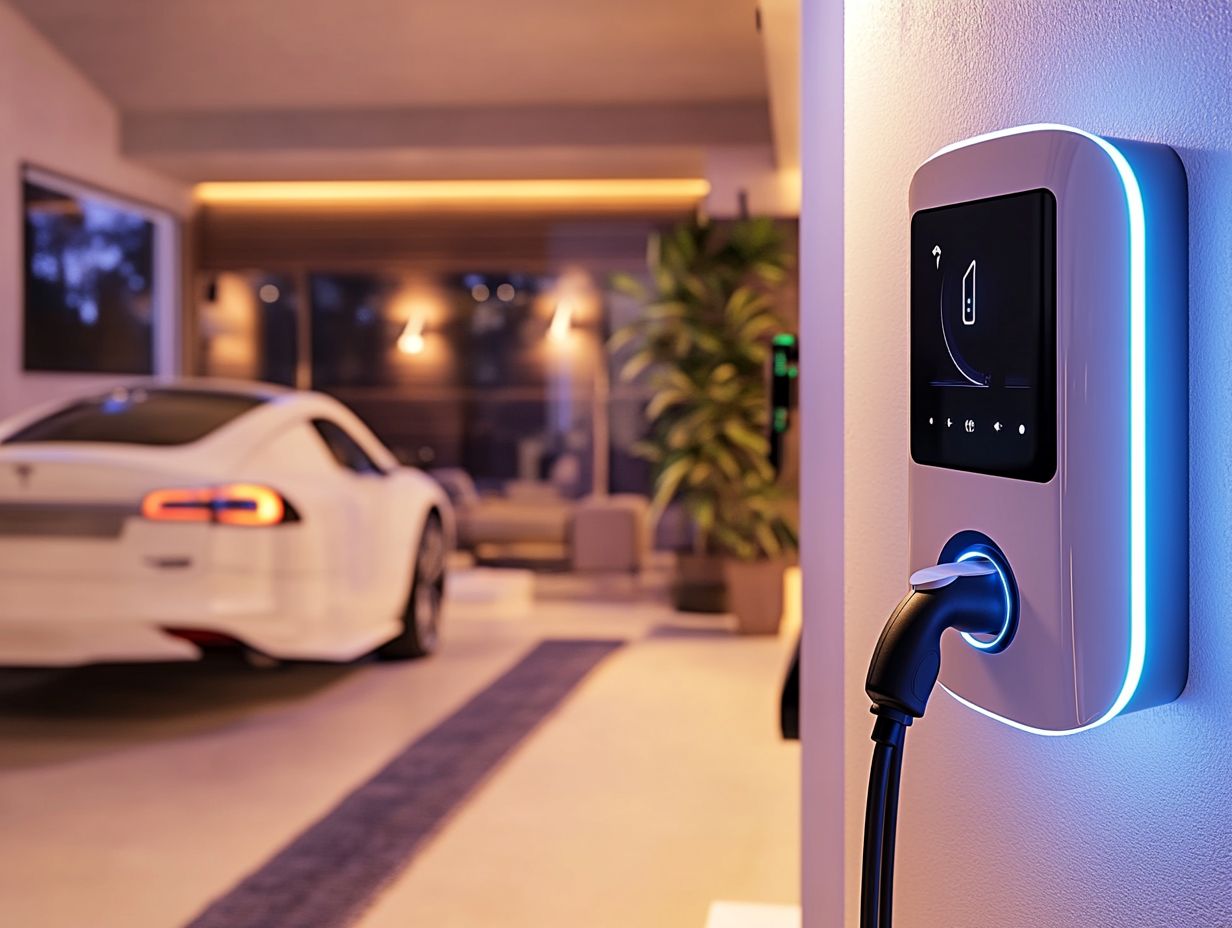
Ensuring compatibility between your home and vehicle is crucial for the effective installation and operation of home charging stations. Mismatches can lead to inefficient charging.
To achieve seamless integration, you need to carefully assess your existing electrical infrastructure, paying close attention to voltage and amp power capabilities.
It’s important to know your electric vehicle’s charging needs whether you need Level 1 or Level 2 options. This choice will greatly affect your equipment selection. Mismatched charging units can slow down charging times and may even pose safety risks, potentially damaging either your vehicle or your home s electrical system.
Before making a purchase, it s wise to consult with professionals who can verify that the charging station you select aligns perfectly with your vehicle’s specifications. This will ensure a smooth and safe charging experience, allowing you to enjoy the convenience of home charging without any headaches.
Alternatives to Home Charging Stations
For individuals unable to install home charging stations, a range of alternatives offers viable charging solutions for electric vehicles. These include public charging stations and fast charging stations, both designed to facilitate rapid charging processes.
Other Options for Charging Electric Vehicles
Along with home charging stations, you ll find a range of other charging options available for electric vehicles, each bringing its own unique advantages in terms of convenience and charging speed. Public charging stations are often conveniently located in urban areas, shopping centers, and along major highways, making them an easily accessible choice for EV owners on the move. You ll appreciate being able to recharge while running errands or taking a well-deserved break during longer journeys.
Fast charging stations take it a step further, delivering a substantial charge in just 30 minutes perfect for those quick stops that keep your road trips on track.
This broad network of charging stations not only enhances your ownership experience but is key to helping promote the wider adoption of electric vehicles, supporting the transition to a more sustainable future.
Frequently Asked Questions
What are the benefits of having a home charging station for my electric vehicle?
Having a home charging station allows you to conveniently charge your electric vehicle at home, saving time and money compared to public charging stations. You also have full control over the charging process and can ensure your vehicle is always fully charged and ready to go.
Are there any drawbacks to having a home charging station?
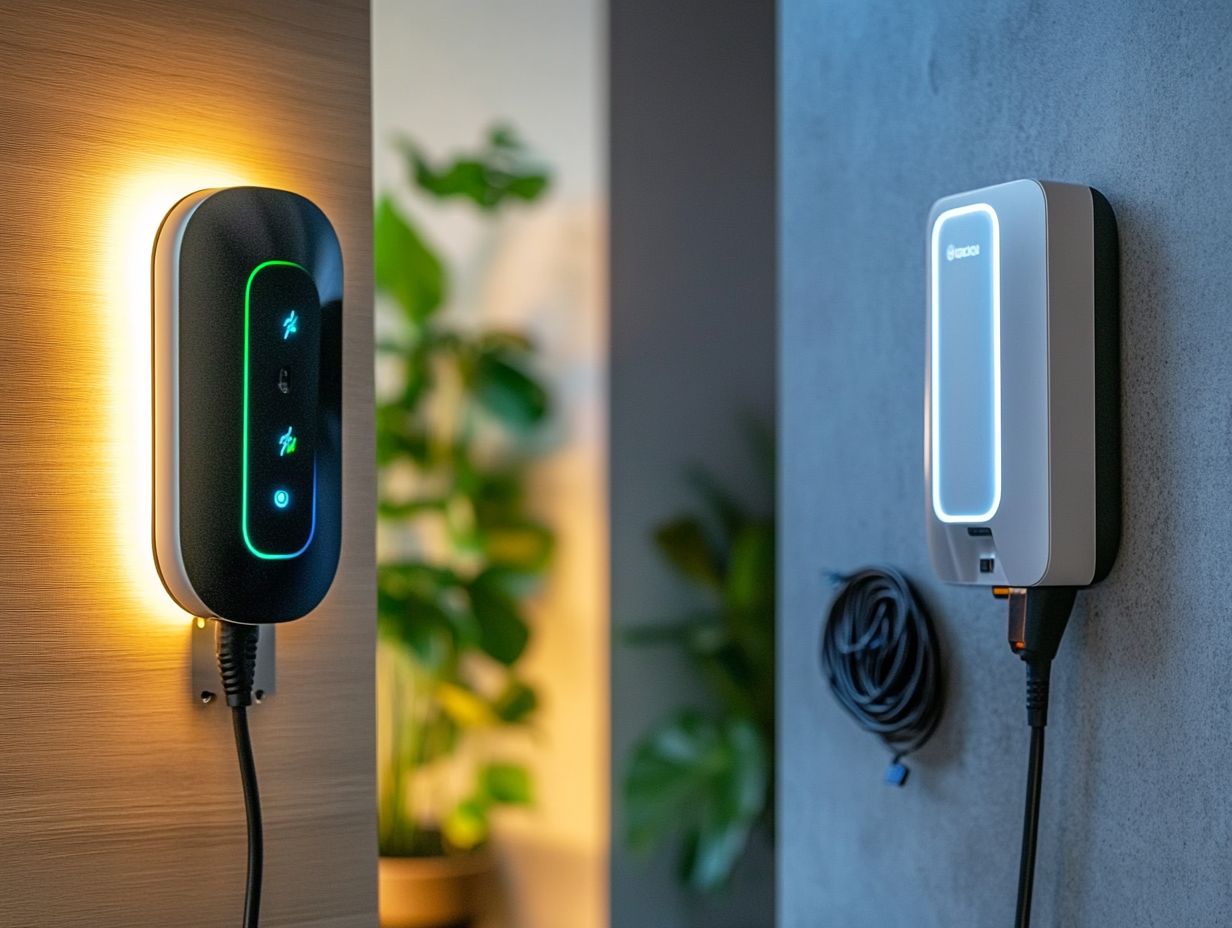
One potential con is the upfront cost of purchasing and installing a home charging station. If you don’t have a dedicated parking spot or garage, installing a home charging station might not be possible.
Can I use a home charging station for all types of electric vehicles?
Generally, home charging stations are compatible with all types of electric vehicles, but it is important to check the specifications and compatibility before purchasing. Some charging stations may have specific requirements for certain vehicles.
How long does it take to charge an electric vehicle using a home charging station?
The time it takes to fully charge an electric vehicle using a home charging station depends on the size of the vehicle’s battery and the charging speed of the station. On average, it can take anywhere from 4-8 hours. However, some newer models of home charging stations have faster charging speeds.
Can I save money by using a home charging station instead of public charging stations?
Yes, using a home charging station can save money in the long run compared to frequently using public charging stations. This is because the cost of electricity at home is typically cheaper than the cost of charging at public stations.
Explore our selection of home charging stations today!
Are there any potential safety concerns with electric vehicle chargers?
Like any electronic device, there s a small risk of malfunction or fire. Proper installation and maintenance are crucial for safety.
If you face any problems, contact a professional electrician right away. Your safety is the top priority!

